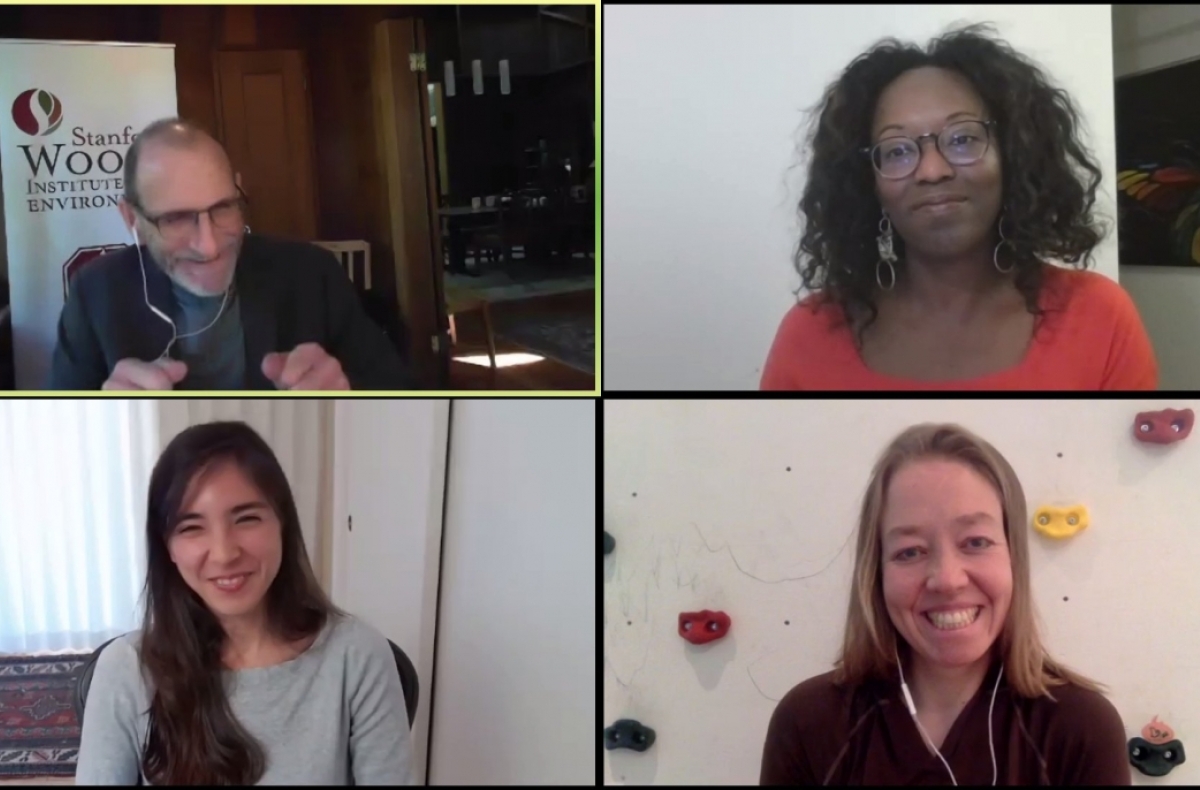The Woods Institute is now part of the Stanford Doerr School of Sustainability
Building Community Resilience Post-Pandemic

The COVID-19 pandemic has made clear the urgent need to help communities better prepare for a range of health and environmental disasters. Experts from Stanford and the Kresge Foundation explored strategies for increasing resilience to climate change, infectious disease and other disasters as part of a recent Stanford Woods Institute for the Environment-hosted webinar.
The panel featured Jalonne L. White-Newsome, Senior Program Officer at the Kresge Foundation, Jenny Suckale, assistant professor of Geophysics, and Gabrielle Wong-Parodi, assistant professor of Earth System Science. Chris Field, Perry L. McCarty Director of the Woods Institute, moderated the discussion, which centered around the severe impact of disasters like COVID-19 and climate-related extreme events on marginalized communities.
Watch the video of this event. And learn more about building back resiliently.
“We have policies that are really built on racism. We have structures and institutions that are not protective of our communities, particularly low-income communities, undocumented citizens, and communities of color,” said White-Newsome. “And this pandemic is not the only case where we’ve seen this play out. It’s been decades of racism that have made these infrastructures and institutions that we rely on consistently not able to protect those that can be most vulnerable in a pandemic.”
The panelists defined resilience as both an external set of actions and an internal force that can be affected by mental and physical health.
“Individuals suffer from post-traumatic stress after experiencing an extreme event like a hurricane that can linger on for years and that could make people more prepared for future events because one of the markers of PTS is vigilance. But at the same time, PTS is also associated with high levels of anxiety and stress, which could manifest in greater disease burdens,” said Wong-Parodi, who is also a center fellow at the Woods Institute and an expert on behavioral psychology in the wake of disasters.
Involving affected communities in the decision-making process around management and preparation for disasters is key, the panelists agreed.
“Inherently our communities of color are resilient by nature because they’ve had to be,” said White-Newsome. “But the purpose of resilience is not to build back the capacity to endure more trauma.” Structural factors may need to be disrupted and reimagined to avoid continued negative impacts of stress and other burdens on vulnerable communities, she said.
"What resilience is and isn't and what makes a community resilient is very individual. You need to have a measure that is authentic to the community. You don't want to go into a community and impose your idea of what resilience is," said Suckale, who is also a center fellow at the Woods Institute and co-director of the Stanford Future Bay Initiative, a partnership with local communities to shape a more equitable, resilient and sustainable urban future.
"The importance of social network and social cohesion is so critical. A lot of times our communities are the first responders. When it comes to building back resiliently, we have to invest in the people infrastructure,” said White-Newsome.
“Solutions need to be realistic, culturally appropriate, in a language that people can understand and use and resource appropriate," said Wong-Parodi.
The panel emphasized that the government needs to work directly with affected communities, listen to their concerns, and provide resources to address health and safety threats. Guidance must be clear and account for orders that may conflict such as evacuating but also social distancing during a disaster coupled with a pandemic. Ultimately, the panel pointed to the importance of ensuring that affected communities are represented among decisionmakers.
“Everybody's voice matters, and how do we make sure everyone is heard?" said Field.
Contact Information
Christine H. Black
Associate Director, Communications
650.725.8240
ChristineBlack@stanford.edu
Devon Ryan
Communications Manager
650.497.0444
devonr@stanford.edu
Rob Jordan
Editor / Senior Writer
650.721.1881
rjordan@stanford.edu


